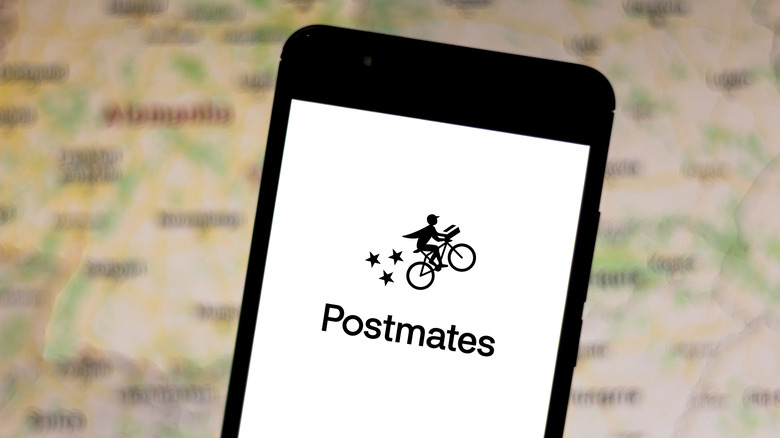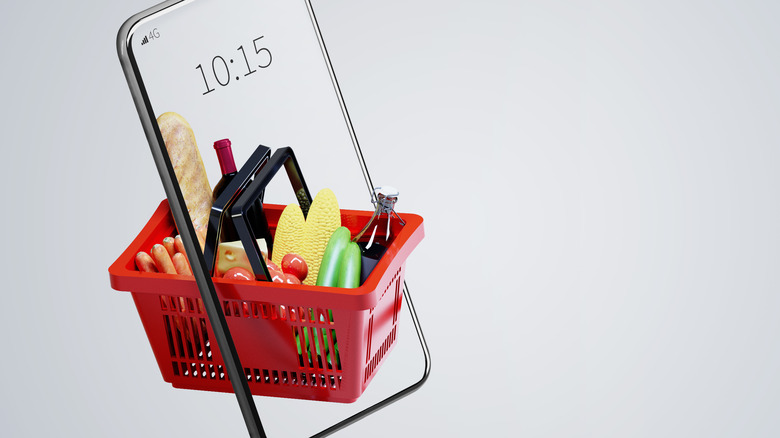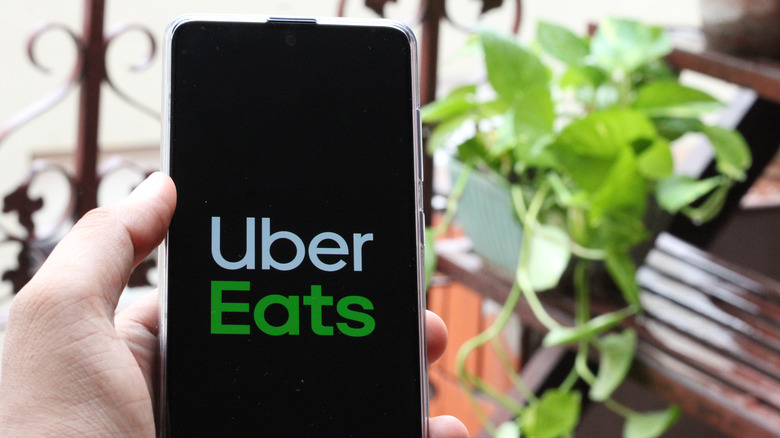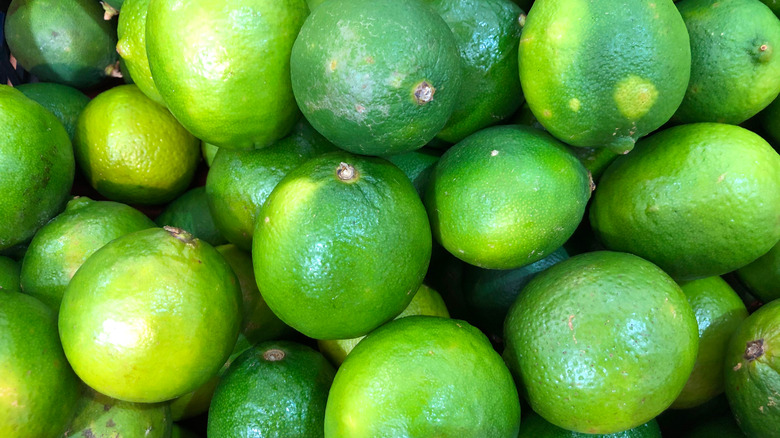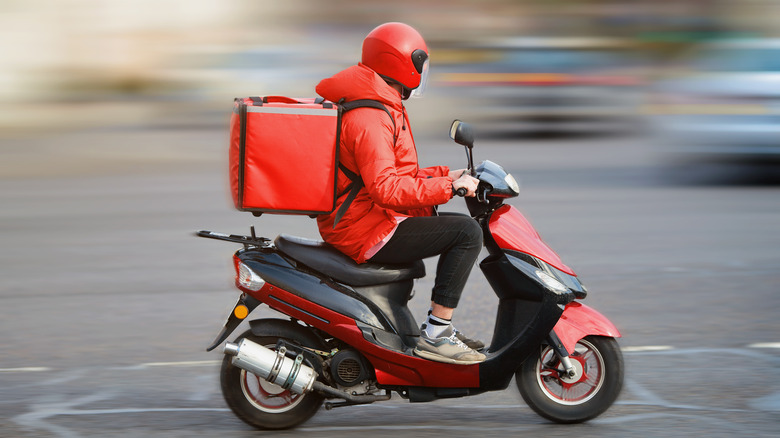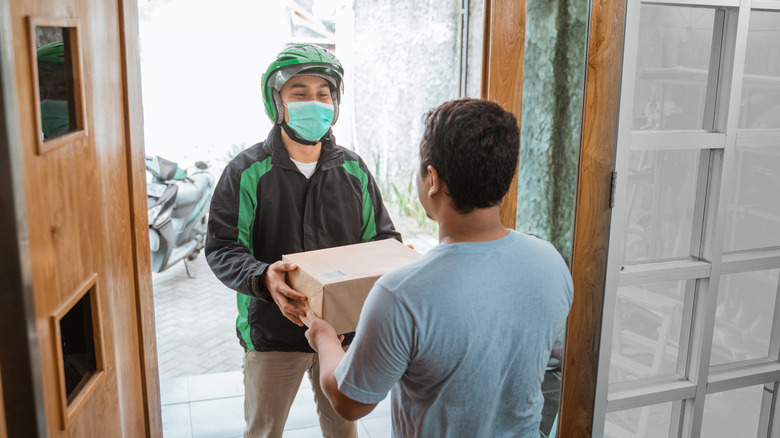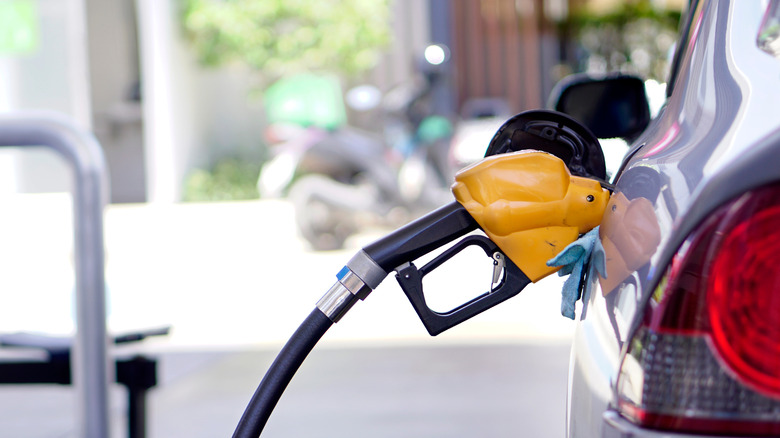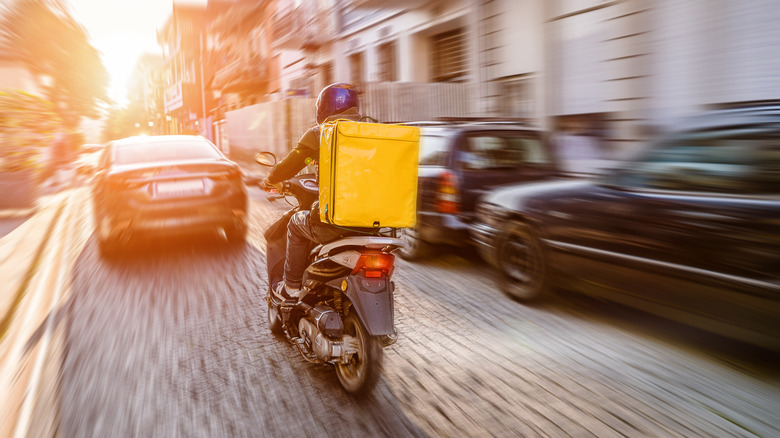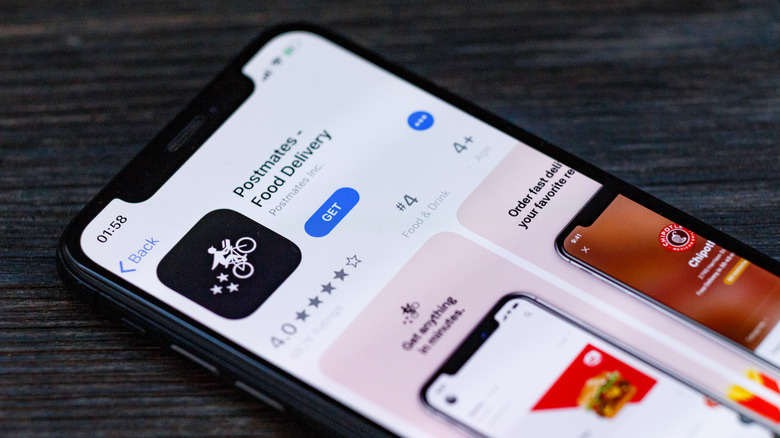The Untold Truth Of Postmates
Food delivery apps have been experiencing steady increases in sales and consumer popularity (via Statista). The pandemic has significantly boosted this growth; according to Adjust, food delivery apps experienced significant growth in 2020.
When Postmates was launched in 2011, it was one of the first apps of its kind on the market, along with companies such as GrubHub, which was established in 2004 (via Verdict Food Service). Today, however, it isn't alone in its goal of delivering food to customers from their favorite restaurants. Following the rise of services such as Uber Eats, DoorDash, as well as other delivery services, Postmates faces some stiff competition in today's market (via Bloomberg Second Measure).
There's so much you don't see when you're looking at your phone screen, placing an order, and picking it up at your front door. Throughout the course of its existence, Postmates has made a lot of waves in the industry, and also made some mistakes in the process. Postmates has had a long and interesting history, from concerns about worker safety to an acquisition by another major player in the delivery field.
Postmates originally delivered anything, and kind of still does
For many, ordering food through Postmates offers a convenient and delicious meal, especially for those times when one cannot be bothered to get up off the couch and into the kitchen to cook.
However, Postmates wasn't initially designed to be a food delivery-focused business: In fact, as per Business Insider, in 2011, Postmates was geared toward trying to displace the postal service. Well, after more than a decade in business, it seems like it's safe to say that Postmates won't be replacing the Postal Service anytime soon, ubiquitous as it may be when it comes to food delivery.
However, that doesn't mean that Postmates only delivers meals from restaurants. In reality, you can snag a ton of stuff from the app, from toiletries and paper goods to over-the-counter medications (via Business Insider). Although apps like Instacart may be more popular for items that you would typically find in a grocery store, Postmates is an efficient alternative, especially if you want a side of fries with your rolls of toilet paper.
The company was initially targeted at small businesses
When Postmates was launched, it specifically did not want to be known as a food delivery service. As CEO, Bastian Lehmann once said, "food to Postmates is what books were to Amazon" (via Business of Apps).
In fact, it wasn't even created to cater to the needs of individual customers. Rather, Postmates was originally designed to meet the needs of small business owners. It was poised to become a platform like Craiglist. It aimed to deliver anything customers need within two to four hours in most cases. Additionally, Postmates also wanted to open a shopfront where local businesses could store items for couriers to deliver (via Insider). According to Lehmann, the company wanted to provide "an infrastructure that local businesses can use."
However, a few years into its opening, Postmates pivoted to individual customers instead. Today, Postmates is mostly known as a food and grocery delivery service that is used by individuals. And, while businesses may use Postmates to order lunch, they're unlikely to use it for other purposes.
Postmates used to have a flat $9.99 delivery fee
The fact that Postmates was able to pull off the food delivery thing is, in itself, a remarkable feat. When Postmates first started out, the app applied a flat rate delivery fee of $9.99 per order, which now seems like a ridiculously high price (via Business of Apps). At the time, its competitors had much lower delivery prices, so it's surprising that Postmates was able to hold on, although, for many California residents, the $10 price tag on the delivery of good food was well worth the price.
Luckily for everyone who uses food delivery apps, Postmates later reduced this fee. By 2015, Postmates had lowered its delivery cost to just $3.99 for "preferred merchants" — less than half of what it was charging before. And it also rolled out a feature that would waive delivery costs on all orders over $30 for just $9.99 a month.
Uber owns Postmates
When you consider Postmates' competitors, it's likely that Uber Eats comes to mind. Uber Eats and Postmates are the two biggest names in the food delivery scene today (via Bloomberg Second Measure). These two have long been fierce competitors, though, as of late 2020, Uber now owns Postmates (via Postmates).
That being said, the two still operate as separate companies so Postmates continues to operate under its name and logo. Uber Eats was always a prominent company but now, with the addition of Postmates to its portfolio, the company stands to dominate the meal delivery sector. With the addition of Postmates, 27% of meal delivery sales in February 2022 were attributed to Uber.
While DoorDash attributed for a whopping 58%, Uber is now undeniably a force to be reckoned with. Now, the only question is, will other food delivery apps be able to compete in the long term? It's hard to tell. One thing is for sure though, Uber Eats and Postmates are unlikely to disappear anytime soon.
Postmates once accidentally sent Chrissy Teigen 200 limes
Have you ever had a delivery order go very, very wrong? It has happened to many of us, and celebrities are no exception. That's just how Chrissy Teigen ended up with 200 limes at her door one day. According to Insider, Teigen ordered five limes using the delivery app, but instead of getting just a few fruits, she received a whopping five bags of limes. Yes, entire bags. That added up to a shocking 200 citrus fruits.
Luckily, Teigen knows how to make her way around a kitchen, so she ended up taking the extras and making a ton of key lime pies with them. Not a bad way to use up extra limes, even if you do end up with far more than you actually need.
As it turns out, it wasn't even the first time Teigen ordered a certain quantity of a food item and ended up with far more than she ever wanted. Once, she received six bunches of bananas instead of the six individual ones that she had ordered. Another time, she ended up with a colossal amount of barbecue sauce. The limes were probably much easier to use up and consume than all that extra sauce.
Postmates workers can create their own schedule
As more and more people work from home these days, many workers no longer want to abide by a normal nine-to-five schedule (via Forbes). They want more freedom over their time, which is one reason why some are trading in their more traditional jobs to work in the gig-based economy. Postmates is one company that allows workers to drive on their own time: According to Career Karma, if you're working as a delivery driver for Postmates, you don't have to abide by a fixed schedule. Rather, you can just log into the app when you're ready to start making deliveries and then get be on your way.
This is super convenient for those who have less-than-traditional schedules. For example, if you have to take care of your kids after they get home from school, you can clock out early. If you only want to work on the weekends to supplement your salary, you can do that as well. However, this kind of system also has its downsides. Workers in the gig economy may not have a reliable, steady source of income as one might with a more traditional work setup. Additionally, Postmates workers are responsible for taxes, insurance, and paying for car maintenance as well as gas.
Postmates couriers face difficult conditions
While the opportunity to set your own hours definitely sounds like a plus, that doesn't mean that delivering with Postmates is the dream job. In fact, employees have a lot of complaints about how the company is run and the subsequent work culture they have to contend with. As per Eater, the job is downright perilous, with couriers having to deal with rude customers and low wages.
Some Postmates delivery drivers have to consistently work 12-hour days just to make enough money to pay their bills. The work itself is stressful and overwhelming, not to mention unpredictable in terms of gains; when workers tip poorly, it may mean that certain trips aren't even worth the gas. Additionally, some couriers with Postmates have detailed the perils of driving in inclement weather for deliveries, in addition to dealing with angry customers.
Since Postmates workers are technically classified as independent contractors, the company doesn't claim responsibility for any of these dangers. Considering that their drivers are doing the essential job of keeping the company running, you would think that Postmates would be more inclined to provide more support and safeguards for their workers as they face these difficult conditions.
Postmates workers are struggling with rising gas prices
Fuel prices tend to fluctuate dependent on world events and other factors (via Pew Research Center). Yet, each time prices rise, most delivery drivers, as independent contractors, have to pay for the increased costs out of their own pocket (via NBC News). Events such as Russia's invasion of Ukraine in March 2022 have caused financial backers and shippers to eschew Russian oil, causing gas prices to rise across the U.S. as well as the rest of the world (as per The Wall Street Journal).
Skyrocketing gas prices are a challenge for drivers, especially those who are already in precarious financial straits. One former Postmates worker told New York Post, "I've been driving for Postmates and now Uber Eats for years, but at the moment, it isn't even worth it anymore. We don't even make enough to get the money in our tanks back. So sad. I was doing deliveries to have some extra cash and help with bills when I didn't have enough. Now I'm just home cuz I'm not seeing the benefit." Hikes in gas prices lead to frustration among food delivery drivers, many of whom may decide that the gig is no longer financially worth it (via USA Today).
Kylie Jenner uses the app frequently
Ever wish you could truly indulge your cravings and have several meals delivered in a month? Though it may be tempting to do so, for many of us, it may not be a financially prudent option. However, if your net worth stands at $700 million, as it does for Kylie Jenner, then ordering via Postmates several times a month is probably just a drop in the bucket (via Harper's Bazaar).
According to Harper's Bazaar, Jenner once spent more than $10,000 in the course of 186 days on Postmates alone. Wondering how she racked up this kind of bill in such a short amount of time? Her most expensive purchase was reportedly a bottle of Don Julio Añejo 1942 Tequila, which, according to Liquor.com, has an MSRP of $140. But not everything she ordered was quite so pricey. One time, she ordered only a Smartwater and a single carrot.
They say celebrities are just like us, but some may think that paying a delivery fee for a single carrot is pretty pricey.
Postmates drivers make around $12 to $18 an hour
Wondering how much you could make as a Postmates driver? For most drivers, the rate is higher than minimum wage: The average Postmates driver makes about $18 an hour, which adds up to around $38,000 a year (via Career Karma). This wage is higher than the average salary of most retail jobs in the U.S. (vis Talent.com). That being said, the average Postmates salary is still unlikely to be enough to live comfortably in major cities in the U.S. (via Yahoo Finance). Additionally, with inflation on the rise and costs of living steadily increasing, the average Postmates salary may not be sufficient to manage costs.
However, the $18 an hour rate for Postmates drivers is an estimated average. Most of the time, in cities where the cost of living is more expensive, Postmates drivers receive higher pay. Additionally, drivers can make more money during surges and peak hours. Drivers that don't drive during these hours and are situated in areas with lower costs of living tend to make significantly less money. Some drivers end up making as little as $12 an hour.
And, when you add in exorbitant gas prices and additional maintenance costs for vehicles, for some Postmates workers, the job simply isn't financially beneficial. Ultimately, Postmates is responsible for paying its workers a livable wage. That being said, considering the difficult working conditions that these workers face, you might want to consider tipping your delivery driver generously.
The company's business boomed during the pandemic
For many businesses across the world, the pandemic was an unmitigated nightmare. Some industries, such as airlines and hotels were adversely affected as the world shut down (via USA Today). However, some businesses flourished and saw unprecedented growth. Consider Zoom: Zoom customer usage increased during the pandemic as some people began working from home, and overall revenues soared by 326% (via The Guardian). Many of us were unfamiliar with Zoom prior to the pandemic, but now, we're accustomed to using it on a daily basis.
Delivery apps also experienced growth during the pandemic, since people were not leaving their homes, and were ordering in rather than going out to eat at their favorite restaurants. In November 2020, Market Watch reported that the pandemic caused the use of delivery apps to double in those first several months. Postmates wasn't alone in this growth, of course — all of its competitors saw a similar boom during this time. However, the growth experienced by Postmates during this time certainly helped cement its strength as a food delivery service.
Postmates faced a lawsuit over their high fees
According to BBC, on average, ordering food delivery via an app is 23% more experience than directly ordering takeaway from a restaurant. If you've ever gone to your favorite restaurant, paid for your meal, and then decided to order the same dish later via a delivery app like Postmates, you may have realized that the price on the app is much, much higher. This high fee, when combined with the delivery charge and tip, adds up to a significant cost for having your food show up at your door.
As it turns out, these prices are so ridiculously high that food apps such as Postmates have faced legal issues over them (via Forbes). In the spring of 2020, a lawsuit was filed against Postmates, Uber Eats, DoorDash, and Grubhub. The suit claimed that the companies had "monopoly power" over the food delivery industry. Many cities such as Chicago and Portland have placed caps on these businesses in order to curb the practices of these businesses, some of which harm restaurants and delivery workers (via Eater). These caps limit the amount these services are allowed to charge for delivery.
In 2021, the big three delivery apps (since Uber Eats had acquired Postmates at this point) pushed back and filed a lawsuit filed against New York City. Two things are true, though: Most of the time, you'll pay way less for your favorite meal if you buy it directly from the restaurant, and many restaurants would probably prefer that you do so too.
